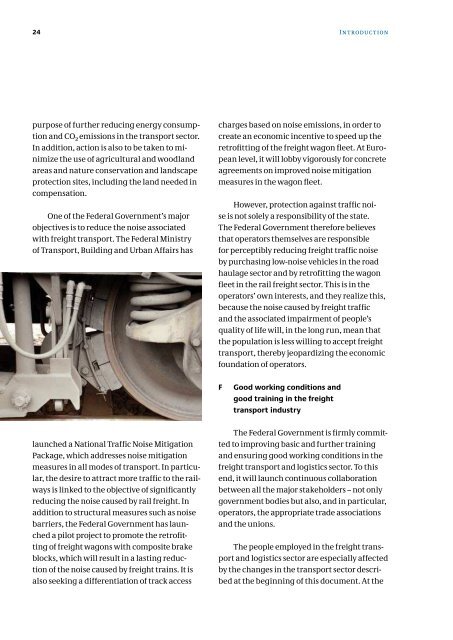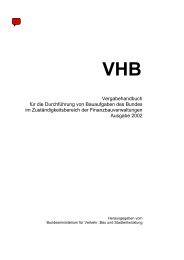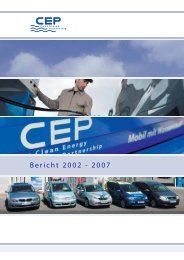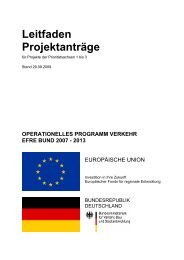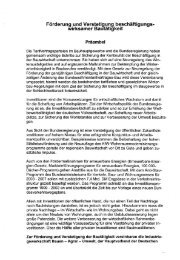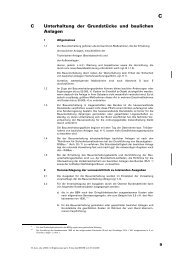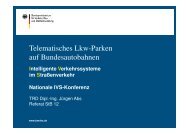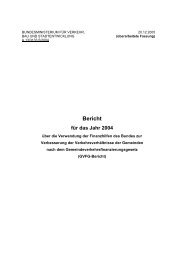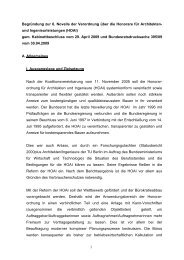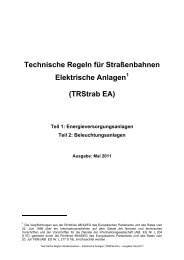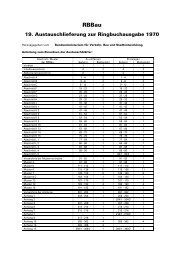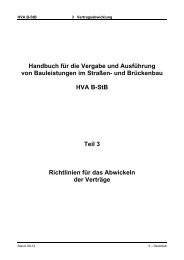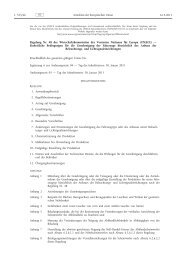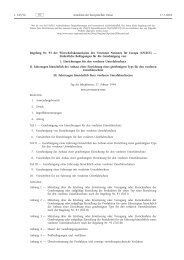Freight Transport and Logistics Masterplan - Bundesministerium für ...
Freight Transport and Logistics Masterplan - Bundesministerium für ...
Freight Transport and Logistics Masterplan - Bundesministerium für ...
Create successful ePaper yourself
Turn your PDF publications into a flip-book with our unique Google optimized e-Paper software.
purpose of further reducing energy consumption<br />
<strong>and</strong> CO ² emissions in the transport sector.<br />
In addition, action is also to be taken to minimize<br />
the use of agricultural <strong>and</strong> woodl<strong>and</strong><br />
areas <strong>and</strong> nature conservation <strong>and</strong> l<strong>and</strong>scape<br />
protection sites, including the l<strong>and</strong> needed in<br />
compensation.<br />
One of the Federal Government’s major<br />
objectives is to reduce the noise associated<br />
with freight transport. The Federal Ministry<br />
of <strong>Transport</strong>, Building <strong>and</strong> Urban Affairs has<br />
launched a National Traffic Noise Mitigation<br />
Package, which addresses noise mitigation<br />
measures in all modes of transport. In particular,<br />
the desire to attract more traffic to the railways<br />
is linked to the objective of significantly<br />
reducing the noise caused by rail freight. In<br />
addition to structural measures such as noise<br />
barriers, the Federal Government has launched<br />
a pilot project to promote the retrofitting<br />
of freight wagons with composite brake<br />
blocks, which will result in a lasting reduction<br />
of the noise caused by freight trains. It is<br />
also seeking a differentiation of track access<br />
charges based on noise emissions, in order to<br />
create an economic incentive to speed up the<br />
retrofitting of the freight wagon fleet. At European<br />
level, it will lobby vigorously for concrete<br />
agreements on improved noise mitigation<br />
measures in the wagon fleet.<br />
However, protection against traffic noise<br />
is not solely a responsibility of the state.<br />
The Federal Government therefore believes<br />
that operators themselves are responsible<br />
for perceptibly reducing freight traffic noise<br />
by purchasing low-noise vehicles in the road<br />
haulage sector <strong>and</strong> by retrofitting the wagon<br />
fleet in the rail freight sector. This is in the<br />
operators’ own interests, <strong>and</strong> they realize this,<br />
because the noise caused by freight traffic<br />
<strong>and</strong> the associated impairment of people’s<br />
quality of life will, in the long run, mean that<br />
the population is less willing to accept freight<br />
transport, thereby jeopardizing the economic<br />
foundation of operators.<br />
F Good working conditions <strong>and</strong><br />
good training in the freight<br />
transport industry<br />
The Federal Government is firmly committed<br />
to improving basic <strong>and</strong> further training<br />
<strong>and</strong> ensuring good working conditions in the<br />
freight transport <strong>and</strong> logistics sector. To this<br />
end, it will launch continuous collaboration<br />
between all the major stakeholders – not only<br />
government bodies but also, <strong>and</strong> in particular,<br />
operators, the appropriate trade associations<br />
<strong>and</strong> the unions.<br />
The people employed in the freight transport<br />
<strong>and</strong> logistics sector are especially affected<br />
by the changes in the transport sector described<br />
at the beginning of this document. At the<br />
Introduction Introduction<br />
same time, they represent the key factor in ensuring<br />
that the German logistics <strong>and</strong> transport<br />
industry enjoys a development that is successful<br />
in the long term. Investment in the training<br />
of their workforce is thus just as important for<br />
the competitiveness of operators as investment<br />
in technology <strong>and</strong> their vehicle fleet. It<br />
is already becoming apparent that there will<br />
be a shortage of skilled labour. To counter this,<br />
the basic <strong>and</strong> further training systems have to<br />
be strengthened <strong>and</strong> evolved to meet the more<br />
exacting requirements.<br />
The Federal Government, together with<br />
operators, trade associations, chambers of<br />
industry <strong>and</strong> commerce, <strong>and</strong> unions, will<br />
thus launch a basic <strong>and</strong> further training drive<br />
before the end of 2008 <strong>and</strong> incorporate it<br />
into the skills initiative for Germany. Regular<br />
industry summits, to which the Federal<br />
Government will invite the aforementioned<br />
players, will be held to achieve continuous<br />
collaboration to improve the basic <strong>and</strong> further<br />
training situation on the logistics market.<br />
The Federal Government also believes that<br />
operators should create additional apprenticeships,<br />
as they pledged to do in the National<br />
Pact for Training <strong>and</strong> Young Skilled Workers<br />
in Germany of 5 March 2007, <strong>and</strong> improve<br />
job skills in order to lay the foundations on<br />
which they will be able meet their rising<br />
dem<strong>and</strong> for skilled labour in the future.<br />
<strong>Logistics</strong> courses in higher education,<br />
despite being of outst<strong>and</strong>ing quality, have so<br />
far tended to receive little attention. In order<br />
to improve the profile of this subject, the Federal<br />
Government will lobby for the creation of<br />
an internationally recognized course of study<br />
that provides basic <strong>and</strong> further training in the<br />
field of logistics <strong>and</strong> that is closely linked with<br />
internationally operating companies in the<br />
sector <strong>and</strong> the leading research institutions.<br />
In addition, the Federal Government will<br />
task the Federal Office for Goods <strong>Transport</strong><br />
with evaluating the working conditions in the<br />
freight transport <strong>and</strong> logistics sector annually<br />
as part of its observation of the freight transport<br />
market. In order to ensure good working<br />
conditions in view of the increasing pressure<br />
to meet tight delivery deadlines that those<br />
employed in the sector are facing, it is absolutely<br />
essential that operators comply with<br />
social legislation <strong>and</strong> provisions governing<br />
health <strong>and</strong> safety at work, road safety <strong>and</strong> the<br />
carriage of dangerous goods. Unless there is<br />
significant progress here, the Federal Government,<br />
in cooperation with the federal states,<br />
will step up checks to prevent social dumping<br />
<strong>and</strong> non-compliance with legislation. It is in<br />
the interests of every operator to comply with<br />
the appropriate rules <strong>and</strong> regulations. Because<br />
satisfied, motivated <strong>and</strong> healthy workers from<br />
the basis of all long-term economic success.


